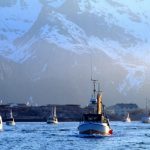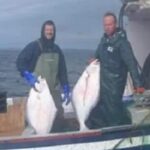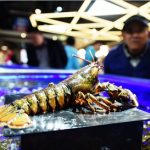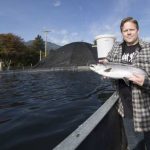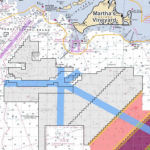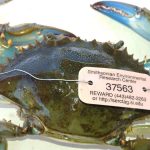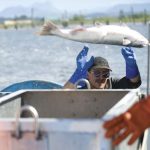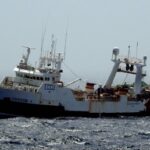Tag Archives: forage fish
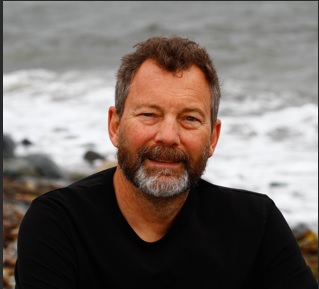
Canada’s efforts to rebuild depleted fish stocks are flopping, says ENGO Oceana
Major spending increases and policy changes by the federal government to protect and rebuild wild fish stocks in Canada have resulted in little improvement, according to the 2022 Fishery Audit released this week by environmental group Oceana Canada. In its sixth annual audit, Oceana says fewer than one third of wild marine fish stocks in Canada are considered healthy and most critically depleted stocks lack plans to rebuild them. The audit assessed 194 fish stocks in Canada. The audit says 72 per cent of DFO’s management documents do not formally consider climate change and that needs to change. >click to read< 12:33
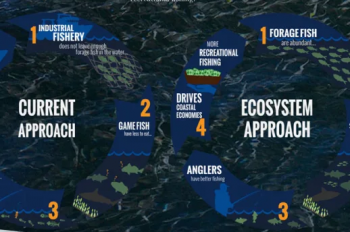
A Forage Fish War – Canadian company targets critical forage fish in Atlantic and Gulf
The two U.S. menhaden fisheries are in the Chesapeake Bay and the Gulf,,, Omega Proteins, headquartered in Canada, has sought certification that the fishery is sustainable.,, Now it has sought the same certification in the Gulf of Mexico, according to a joint statement from the American Sportfishing Association, the Coastal Conservation Association, and the Theodore Roosevelt Conservation Partnership.,, “The ASA, Theodore Roosevelt , and CCA, have formally objected, That steep price (of MSC certification) caused Sport Fish Magazine writer Doug Olander to pen a satirical op-ed,,,That prompted a swift backlash by Omega Proteins, “According to the ASMFC [Atlantic States Marine Fisheries Commission], Striped Bass are overfi…>click to read<17:23
Decision coming Monday on Menhaden management
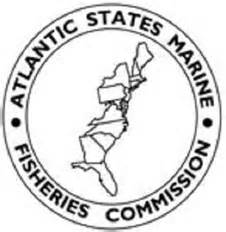 The Atlantic States Marine Fisheries Commission will decide on a new management plan for Atlantic menhaden at a meeting near Baltimore on Monday. Fishermen and environmentalists have a lot riding on how much of the resource is set aside for fishing, and how much is left for wildlife predators. Known as Amendment 3, the new rule will set the future course for managing the forage fish species eaten by many other fish, birds like osprey, dolphins and whales. click here to read the story Atlantic Menhaden Management Board – The Board will meet to consider approval of Amendment 3 to the Interstate Fishery Management Plan for Atlantic Menhaden. click here to read 3 sets of meeting materials 10:35
The Atlantic States Marine Fisheries Commission will decide on a new management plan for Atlantic menhaden at a meeting near Baltimore on Monday. Fishermen and environmentalists have a lot riding on how much of the resource is set aside for fishing, and how much is left for wildlife predators. Known as Amendment 3, the new rule will set the future course for managing the forage fish species eaten by many other fish, birds like osprey, dolphins and whales. click here to read the story Atlantic Menhaden Management Board – The Board will meet to consider approval of Amendment 3 to the Interstate Fishery Management Plan for Atlantic Menhaden. click here to read 3 sets of meeting materials 10:35
D.B. Pleschner: Study: No correlation between forage fish, predator populations
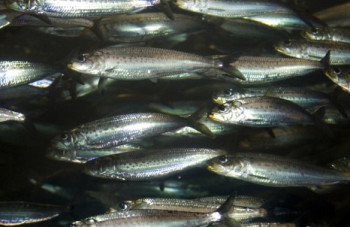 On April 9-10, the Pacific Fishery Management Council is meeting in Sacramento to deliberate on anchovy management and decide on 2017 harvest limits for sardine, two prominent west coast forage fish. Extreme environmental groups like Oceana and Pew have plastered social media with allegations that the anchovy population has crashed, sardines are being overfished and fisheries should be curtailed, despite ample evidence to the contrary. Beyond multiple lines of recent evidence that both sardines and anchovy populations are increasing in the ocean, a new study published this week in the journal Fisheries Research finds that the abundance of these and other forage fish species is driven primarily by environmental cycles with little impact from fishing, and well-managed fisheries have a negligible impact on predators — such as larger fish, sea lions and seabirds. This finding flies directly in the face of previous assumptions prominent in a 2012 study commissioned by the Lenfest Ocean Program, funded by the Pew Charitable Trusts, heirs of Sun Oil Company. The Lenfest study concluded that forage fish are twice as valuable when left in the water to be eaten by predators and recommended slashing forage fishery catch rates by 50 to 80 percent. click here to continue reading the article 20:39
On April 9-10, the Pacific Fishery Management Council is meeting in Sacramento to deliberate on anchovy management and decide on 2017 harvest limits for sardine, two prominent west coast forage fish. Extreme environmental groups like Oceana and Pew have plastered social media with allegations that the anchovy population has crashed, sardines are being overfished and fisheries should be curtailed, despite ample evidence to the contrary. Beyond multiple lines of recent evidence that both sardines and anchovy populations are increasing in the ocean, a new study published this week in the journal Fisheries Research finds that the abundance of these and other forage fish species is driven primarily by environmental cycles with little impact from fishing, and well-managed fisheries have a negligible impact on predators — such as larger fish, sea lions and seabirds. This finding flies directly in the face of previous assumptions prominent in a 2012 study commissioned by the Lenfest Ocean Program, funded by the Pew Charitable Trusts, heirs of Sun Oil Company. The Lenfest study concluded that forage fish are twice as valuable when left in the water to be eaten by predators and recommended slashing forage fishery catch rates by 50 to 80 percent. click here to continue reading the article 20:39
Ray Hilborn study disputes previous findings on forage fish
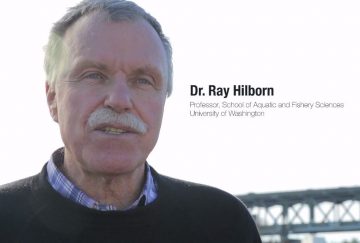 A new study has been published today by a scientific group led by University of Washington fisheries researcher Ray Hilborn that disputes previous findings on the impact of human and natural predation on forage fish such as anchovies, sardines and herring. The study, published in the scientific journal Fisheries Research, found that human fishing for forage fish does not have as great an impact on the food chain as previously thought, given that humans typically catch fish of much larger size than those typically hunted and eaten by non-human species. The study also decouples the link between the size of forage fish populations and the populations of species that predate on forage fish. “What we found is that there is essentially no relationship between how many forage fish there are in the ocean and how well predators do in terms of whether the populations increase or decrease,” Hilborn said in a video explaining the study’s findings. Video, continue reading the story here 11:47
A new study has been published today by a scientific group led by University of Washington fisheries researcher Ray Hilborn that disputes previous findings on the impact of human and natural predation on forage fish such as anchovies, sardines and herring. The study, published in the scientific journal Fisheries Research, found that human fishing for forage fish does not have as great an impact on the food chain as previously thought, given that humans typically catch fish of much larger size than those typically hunted and eaten by non-human species. The study also decouples the link between the size of forage fish populations and the populations of species that predate on forage fish. “What we found is that there is essentially no relationship between how many forage fish there are in the ocean and how well predators do in terms of whether the populations increase or decrease,” Hilborn said in a video explaining the study’s findings. Video, continue reading the story here 11:47
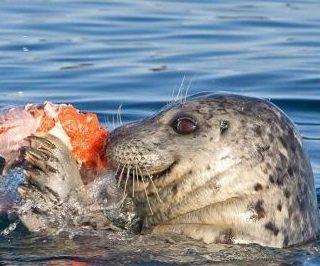
Study says seals eat more Chinook than Southern resident killer whales
Seals are eating more Chinook than Southern resident killer whales. That’s bad for both endangered species’ recoveries. “The seals might not be the enemy as much as the problem is that we’ve lost forage fish available to them,” said Joe Gaydos, science director of the SeaDoc Society on Orcas Island. According to a recent Canadian study, the amount of Chinook salmon eaten by seals in the Salish Sea has increased from 68 metric tons in 1970 to 625 metric tons in 2015. That’s double the amount Southern resident killer whales ate in 2015 in the same location, and six times more than commercial and recreational fisheries according to the study. Continue reading the story here 12:20
The Oregon Department of Fish and Wildlife has drafted a “forage fish” plan
 Oregon fishery managers are quietly embarking on a plan to ban new commercial fisheries on several species of small ocean fish considered diet staples for salmon and sea birds. The Oregon Department of Fish and Wildlife has drafted a plan to ensure that certain smelts, squids, sand lance and other so-called “forage fish” remain prey for larger fish like salmon and myriad sea birds in Oregon’s near-shore waters. The draft plan does not restrict any current commercial fisheries. But it does address “by-catch” that occurs during commercial seasons for species such as sardine and Pacific whiting in which non-target species are caught. Only Alaska has a similar ban on new commercial seasons on near-shore forage fish, according to the Pew Charitable Trust, which has trumpeted forage-fish protection for years. Read the story here Read Dick Grachek’s, THE FORAGE FISH FARCE Click here 12:50
Oregon fishery managers are quietly embarking on a plan to ban new commercial fisheries on several species of small ocean fish considered diet staples for salmon and sea birds. The Oregon Department of Fish and Wildlife has drafted a plan to ensure that certain smelts, squids, sand lance and other so-called “forage fish” remain prey for larger fish like salmon and myriad sea birds in Oregon’s near-shore waters. The draft plan does not restrict any current commercial fisheries. But it does address “by-catch” that occurs during commercial seasons for species such as sardine and Pacific whiting in which non-target species are caught. Only Alaska has a similar ban on new commercial seasons on near-shore forage fish, according to the Pew Charitable Trust, which has trumpeted forage-fish protection for years. Read the story here Read Dick Grachek’s, THE FORAGE FISH FARCE Click here 12:50
Oceana, fishers and scientists differ on heavy anchovy declines
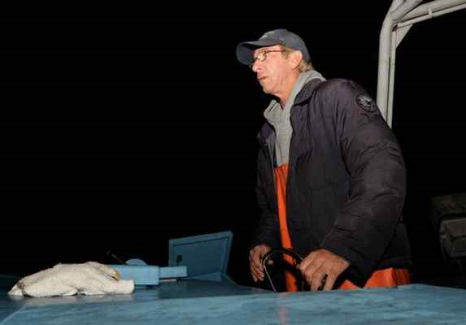 “Sea lions rely on forage fish for survival. But years of overfishing have put this important food source in jeopardy,” Ushkowitz narrates while underwater footage shows her swimming through kelp. “Join Oceana and help protect forage fish in the Pacific. … We need to stop this and replenish.” The West Coast’s leading fishery scientists, however, disagree. They believe the fish are most likely enduring natural population fluctuations and are on the cusp of making a big comeback. Oceana, a nonprofit advocacy organization favored by celebrities such as Leonardo DiCaprio,,, Read the article here 09:40
“Sea lions rely on forage fish for survival. But years of overfishing have put this important food source in jeopardy,” Ushkowitz narrates while underwater footage shows her swimming through kelp. “Join Oceana and help protect forage fish in the Pacific. … We need to stop this and replenish.” The West Coast’s leading fishery scientists, however, disagree. They believe the fish are most likely enduring natural population fluctuations and are on the cusp of making a big comeback. Oceana, a nonprofit advocacy organization favored by celebrities such as Leonardo DiCaprio,,, Read the article here 09:40
West Coast fishery managers (PFMC) days away from landmark decision on forage fish
 West coast fishery managers are poised to make a decision next week that could alter the future of fishing in federal waters off the Pacific Coast, as well as in Oregon’s state-regulated nearshore waters. The Pacific Fishery Management Council is scheduled to vote Monday on a proposal to restrict new forage fisheries off the coast of California, Oregon and Washington unless prospective fishermen can prove harvesting a new species would not damage the ecosystem. Read the rest here 14:21
West coast fishery managers are poised to make a decision next week that could alter the future of fishing in federal waters off the Pacific Coast, as well as in Oregon’s state-regulated nearshore waters. The Pacific Fishery Management Council is scheduled to vote Monday on a proposal to restrict new forage fisheries off the coast of California, Oregon and Washington unless prospective fishermen can prove harvesting a new species would not damage the ecosystem. Read the rest here 14:21
Forage fish management key to protecting Pacific Ocean ecosystem health
Pacific sardine populations have shown an alarming decline in recent years, and some evidence suggests anchovy and herring populations may be dropping as well. The declines could push fishermen toward other currently unmanaged “forage fish,” Read more here 10:35 The Forage Fish Farce
Pew/NatGeo Column Oversimplifies Ecosystem-Based Management of “Forage Fish”
 WASHINGTON (Saving Seafood) May 7, 2014 — In a recent article, “The ABCs of Ecosystem-Based Fisheries Management-Part II,” the Pew Charitable Trusts’ Director of Federal Fisheries Policy and National Geographic online guest writer, Lee Crockett, focuses on the management of “forage fish” — a much used, though highly debated categorization for a number of small, marine species. The article’s title suggests,,, Read more here 14:13
WASHINGTON (Saving Seafood) May 7, 2014 — In a recent article, “The ABCs of Ecosystem-Based Fisheries Management-Part II,” the Pew Charitable Trusts’ Director of Federal Fisheries Policy and National Geographic online guest writer, Lee Crockett, focuses on the management of “forage fish” — a much used, though highly debated categorization for a number of small, marine species. The article’s title suggests,,, Read more here 14:13
The Bottom Line: Time to Protect Pacific Forage Fish. The Real Bottom Line- The Forage Fish Farce
Time to Protect Pacific Forage Fish
I learned long ago that it pays to plan ahead before I hit the water for a day of fishing. Knowing the tides, watching the weather, and reading the fishing blogs for the latest intelligence can make all the difference. Lee Crockett of The Pew Charitable Trusts 11:22
THE FORAGE FISH FARCE by Dick Grachek
The Providence Journal’s “PolitiFact” unit investigated claims made by Pew Environment Group in advertisements they ran in several newspapers asking east coast governors to support their demand for a 50% cut in the menhaden harvest. Pew justified this demand saying “… in recent years, menhaden numbers along our coast have plummeted by 90 percent.” more here
On “Forage Fish”, Pew’s Peter Baker Misses the Mark, savingseafood.org tears through the dogma.

 The paper’s recommendations are based around the assumption that “forage fish” is a legitimate and useful categorization of species to be used in fisheries management, and that the various “forage species” can be managed under the same broad guidelines. Specifically, continued
The paper’s recommendations are based around the assumption that “forage fish” is a legitimate and useful categorization of species to be used in fisheries management, and that the various “forage species” can be managed under the same broad guidelines. Specifically, continued
MENHADEN DEFENDERS: Mini (the dolphin) Needs Menhaden – savingseafood.orgs excellent analysis rebutts. (Mini won’t be going hungry!)
Our grassroots group, “Menhaden Defenders” has been working with fellow anglers to increase awareness and get fisherman involved in the fight because they are on the front lines and have watched this vital
forage fish vanish right before their eyes. After sitting before the Atlantic States Marine Fishery Commission (ASMFC) last week, it frustrated me to listen to our publicly appointed commissioners openly debate
whether or n……
Analysis: Menhaden Defenders’ Paul Eidman, in his article, “Mini Needs Menhaden,” writes of “an ecological disaster in the making” unless new limits are imposed on the Atlantic menhaden fishery.
This is just one of several exaggerated claims about the current state of menhaden management in the article, which fails to present several key facts in its account……Read More.


































